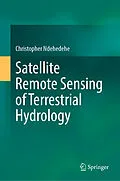This book highlights several opportunities that exist in satellite remote sensing of large-scale terrestrial hydrology. It lays bare the novel concept of remote sensing hydrology and demonstrates key applications of advance satellite technology and new methods in advancing our fundamental understanding of environmental systems. This includes, using state-of-the-art satellite hydrology missions like the Gravity Recovery and Climate Experiment and other multi-mission satellite systems as important tools that underpin water resources planning and accounting. This book discusses and demonstrates how the efficacy, simplicity, and sophistication in novel computing platforms for big earth observation data can help facilitate environmental monitoring and improve contemporary understanding of climate change impacts on freshwater resources. It also provides opportunities for practitioners and relevant government agencies to leverage satellite-based information in a transdisciplinary context to address several environmental issues affecting society. This book provides a general framework and highlights methods to help improve our understanding of hydrological processes and impact analysis from extreme events (e.g., droughts, floods) and climate change.
Inhalt
Part 1
Chapter 1 Introduction
Chapter 2 Global water sytems
Part 2
Chapter 3 Optical Remote Sensing Systems
Chapter 4 Satellite Geodetic Missions
Part 3
Chapter 5 GEE Chapter
Part 4
Chapter 6 Remote Sensing of Freshwater HabitatsChapter 7 Remote sensing of vegetation changes
Part 5
Chapter 8 groundwater from spacePart 6
Chapter 9 Impacts of Climate Change on Hydrological Cycle
Chapter 10 Drought metrics and Indicators
Part 7
Chapter 11 Hydrolological variability
Part 8
Chapter 12 Statistical methods in hydrology
Part 9
Chapter 13 SA_JoH
Part 10
Chapter 14 JoH_Regional
Part 11
Chapter 15 STOTEN
Chapter 16 Climatic Change
Part 12
Chapter 17 Flinders
Chapter 18 Mitchell
Part 13
Chapter 19 Brazil droughtChapter 20 LCB STOTEN
Appendix
